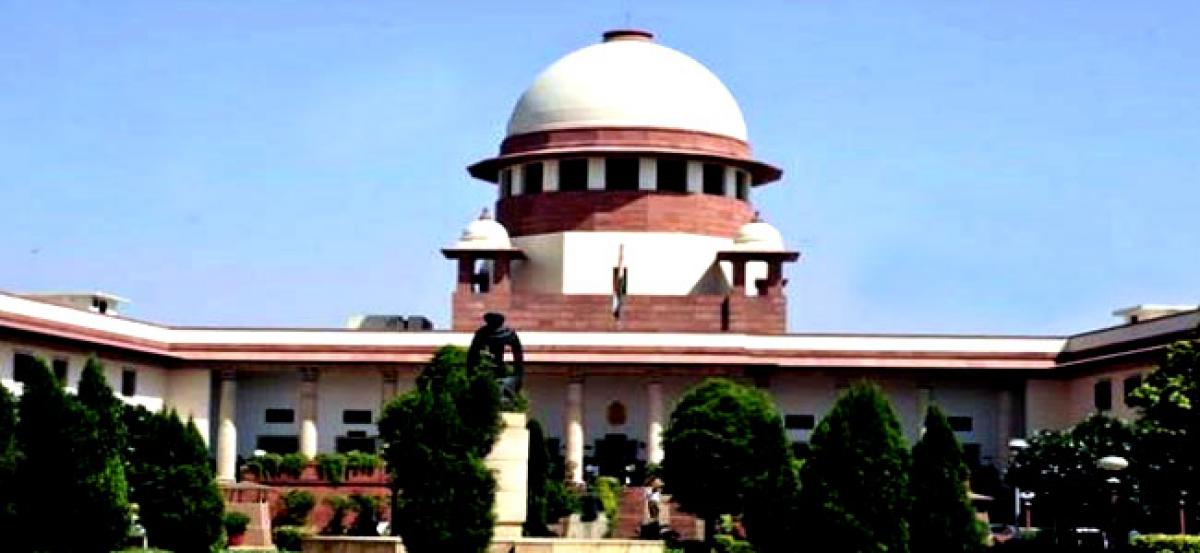Live
- Over 7,600 Syrians return from Turkiye in five days after Assad's downfall: minister
- Delhi BJP leaders stay overnight in 1,194 slum clusters
- Keerthy Suresh and Anthony Thattil Tie the Knot in a Christian Ceremony
- AAP, BJP making false promises to slum dwellers for votes: Delhi Congress
- 'Vere Level Office' Review: A Refreshing Take on Corporate Life with Humor and Heart
- Libya's oil company declares force majeure at key refinery following clashes
- Illegal Rohingyas: BJP seeks Assembly session to implement NRC in Delhi
- Philippines orders full evacuation amid possible volcanic re-eruption
- Government Prioritizes Welfare of the Poor, says Dola Sri Bala Veeranjaneyaswamy
- Two Russian oil tankers with 29 on board damaged due to bad weather
Just In

The Supreme Court on Tuesday posed whether the government was not entitled to seek proof of identity from citizens if their entitlement to certain benefits were dependent upon their identities.
The Supreme Court on Tuesday posed whether the government was not entitled to seek proof of identity from citizens if their entitlement to certain benefits were dependent upon their identities.
A five-judge constitution bench headed by Chief Justice Dipak Misra also said that idea behind the Aadhaar scheme could be the reason that people should have one ID card.
"If your entitlement depends on who you are, then can the government not require proof on that count? Is it not a reasonable condition," a bench, which also comprised Justices A K Sikri, A M Khanwilkar, D Y Chandrachud and Ashok Bhushan, asked.
The bench, hearing pleas challenging the constitutional validity of the Aadhaar scheme and the enabling 2016 law, said, "even if entitlement is beyond dispute, there has to be minimal way of proving who you are".
"A condition is unconstitutional if it requires you to relinquish a constitutional right," the bench said.
The observations came after it was argued that the primary status of a person is that of a citizen and not an Aadhaar card holder.
Senior advocate Kapil Sibal, appearing for the West Bengal government, said the proof of identity has to be linked with the status of the person which entitles him or her for the benefit and moreover, the citizens must have the choice to prove their identity.
He then referred to the example of a woman entitled for widow pension, and said it was her status which enabled her to get the benefit and not the identity, and the State cannot insist that the identity has to be proved through Aadhaar only.
"I can have different ways of proving my identity as a citizen. There are various ways of establishing identity. Aadhaar does not establish my status," Sibal said, adding that the biggest identity is the identity as the citizens.
On the issue of some people having multiple passports and ration cards, the senior advocate said there were laws to deal with law-breakers and it does not mean that the State will make a statute having unconstitutional provisions to deal with law abiding citizens.
Sibal termed the Aadhaar case as "the most important case since independence" as it would decide the future course to be adopted by the nation.
"The judgement in this case will decide the course that this country takes. Will we live in a country where there is choice - or do we live in a country where the State is the arbiter of choice," he said, adding that what the court will decide would relate to "me, my children, my grand children and their unborn children".
At the outset, the senior lawyer said in most secured countries, the government takes the citizens' information for 10 years only and then all database are deleted. And this data is used for limited purposes.
Terming information as the most important aspect, he said that firms, involved with IT, were creating more wealth than traditional companies and gave illustrations of Tripadvisor, Alibaba, Uber, WhatsApp and other websites.
Referring to various provisions of the Aadhaar Act, he said that architecture of the law was "unconstitutional" and submitted that the nine-judge bench's privacy judgement had laid down that "the identity of a person cannot be made a public identity and the identity details cannot be centralised".
"Our fundamental identity is that we are the citizen of India," he said and added that the Aadhaar law presumed a "person to be criminal until he is proved innocent".
He said that there was no difficulty in connecting identity to status, but the primary status of a person is that of a citizen and not as an Aadhaar card holder.
Referring to the doctrine of "unconstitutional conditions", Sibal said the State cannot make a benefit or privilege conditional upon an individual giving up his or her other rights including fundamental ones.
Highlighting the impact of the Aadhaar scheme, he said the members of the society cannot surrender the rights on behalf of future members which are yet to come to the world.
The CJI summed up the submission of Sibal saying that "you cannot be asked to barter or surrender one fundamental right in order to have access to another".
After Sibal concluded his submissions, another senior lawyer Gopal Subramanium began his arguments saying the Aadhaar scheme infringed dignity, freedom and equality and turns a person into a digital entity.
The hearing will resume on February 15.
Earlier, the court had said that issues like denial of benefits to citizens for either want of Aadhaar or due to its non-authentication may not be a ground for holding the law as "unconstitutional".
The apex court had on December 15 last year extended till March 31 the deadline for mandatory linking of Aadhaar with various services and welfare schemes of all ministries and departments of the Centre, states and Union territories.

© 2024 Hyderabad Media House Limited/The Hans India. All rights reserved. Powered by hocalwire.com







